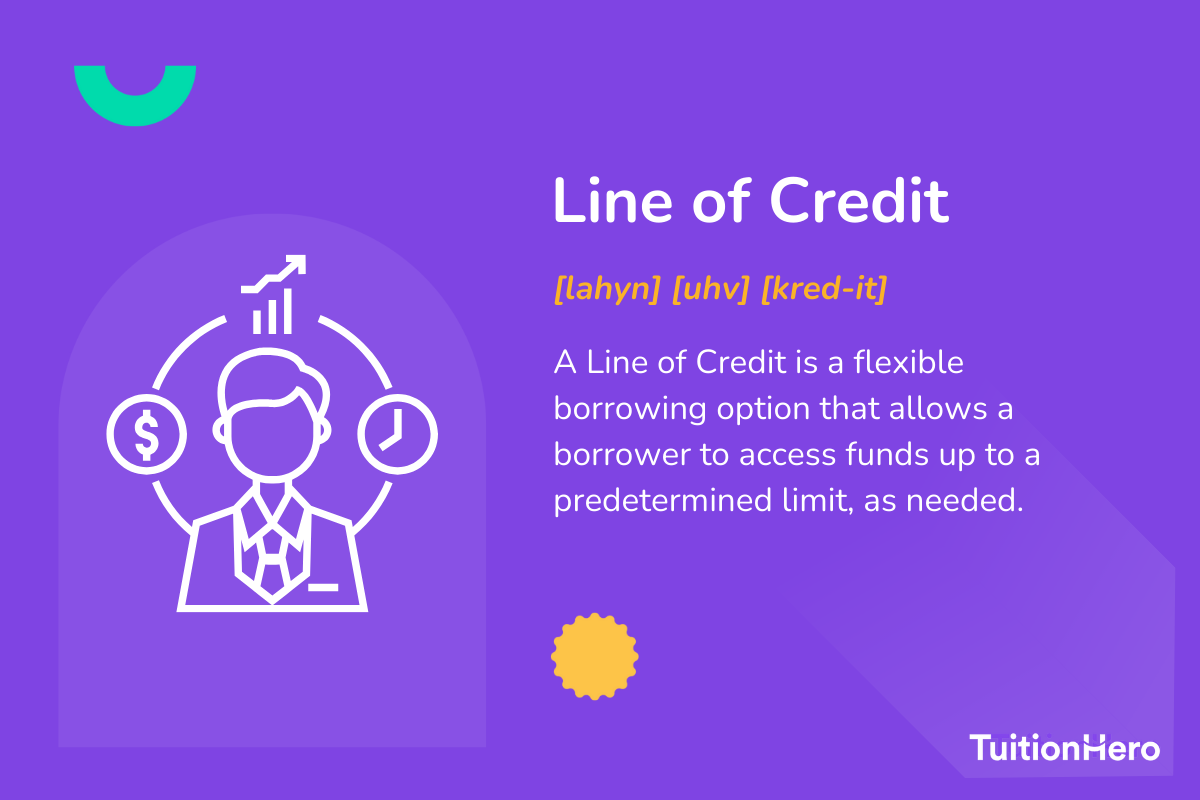Advertiser Disclosure
Last update: November 17, 2024
5 minutes read
What is a Line of Credit?
Need flexible funding for unexpected expenses? Learn how a line of credit works and benefits your finance strategy.

By Derick Rodriguez, Associate Editor
Edited by Brian Flaherty, B.A. Economics
Learn more about our editorial standards



By Derick Rodriguez, Associate Editor
Edited by Brian Flaherty, B.A. Economics
Learn more about our editorial standards
Understanding different types of credit is important for managing money. A line of credit is one type, different from loans or credit cards. At TuitionHero, we’re here to help you navigate these different loan types to make the best financial decisions. Let's explore how lines of credit compare to other options.

Key takeaways
- Lines of credit offer flexibility and access to funds as needed
- Interest is only paid on the amount drawn from the line of credit
- Comparing financial products like personal loans and credit cards is crucial
What is a line of credit?
A line of credit is a flexible loan from a bank or financial institution. Unlike traditional loans, it allows borrowers to access money when they need it, rather than providing them with cash upfront. Usually, there is a maximum amount borrowers can withdraw from their line of credit.
This financial tool is known for its flexibility and convenience, letting you borrow exactly what you need (up to a pre-approved limit) and pay interest only on the amount used. Lines of credit come in two main flavors: secured and unsecured.
Secured lines need collateral, like a home in the case of a HELOC (Home Equity Line of Credit). Secured lines of credit offer lower interest rates due to the decreased risk for lenders. Unsecured lines, on the other hand, don't need collateral but usually come with higher interest rates, reflecting the increased risk for the lender.

Here are a few key points to remember:
- A line of credit provides flexible access to funds.
- Interest is only paid on the money that you actually use.
- There are both secured and unsecured options available.
Choosing between these options can be challenging, especially if you’re already trying to stay on top of existing debt obligations. That's why TuitionHero's resources on refinancing student loans and managing your personal finances could be really helpful.
Exploring the benefits of a line of credit
When you're thinking about getting a line of credit, it's important to know how it can help you. A line of credit lets you access money when you need it, which can be helpful for both planned and unexpected expenses.
Immediate access to funds when you need them
A line of credit is great because you can get money right away. Once you're approved, you can take out money up to a certain limit whenever you need it, without having to apply again and again.
This feature helps when you have sudden expenses that you need to handle quickly, like emergency medical bills or car repairs.

TuitionHero Tip
If you need help with managing surprise education costs, you can get useful information on student loan disbursement.
Only pay interest on what you use
With a line of credit, you only pay interest on the money you withdraw, unlike traditional loans, where you pay interest on the full amount. This can save you money, especially if you need flexible funding over time rather than a lump sum.
Reusable as you repay
As you pay back what you borrowed, your available credit goes up again. This makes it a useful resource you can keep using whenever you need it, whether for personal or business reasons.
How a line of credit compares to other financial options
Different financial products serve different needs. Comparing a line of credit with other options, like personal loans and credit cards, can help clarify which option best suits your financial situation.
Compared to personal loans
Personal loans offer a lump sum that you start to pay back with interest in fixed monthly installments. The key difference is in the flexibility; a line of credit gives you the ability to borrow only what you need when you need it, possibly leading to lower interest costs over time. You can learn more by exploring refinancing loans and lines of credit.
Compared to credit cards
Credit cards are similar to lines of credit in that you only need to borrow what you need to use, rather than taking out a lump sum. Credit cards, however, come with higher interest rates and usually lower minimums. They're helpful for everyday spending, but for bigger expenses, a line of credit might be better.
Using credit cards wisely alongside other financial tools is crucial. Understanding different credit card options helps you make better decisions based on your specific needs, financial situation, and ability to repay.
Compare private student loans now
TuitionHero simplifies your student loan decision, with multiple top loans side-by-side.
Compare Rates
Dos and don'ts of using a line of credit
When you're using a line of credit, there are some important things to do and some mistakes to steer clear of. Understanding these can help you manage your line of credit better, so it helps you financially instead of causing problems.
Do
Check your balance regularly
Make payments on time
Understand the terms and conditions
Don't
Withdraw the maximum amount immediately
Use it for impulsive purchases
Neglect interest rates and fees

Advantages and disadvantages of using a line of credit
A line of credit is like a flexible loan that you can use when you need money. Understanding its pros and cons can help you manage it better.
- Flexibility in how you use and pay back money lets you manage your finances the way you want, whether it's for yourself or your business.
- Having money available when you need it helps cover surprise costs without having to ask for many loans.
- Potential lower interest rates compared to credit cards mean cost savings on borrowed amounts.
- The ease of drawing down a line of credit can cause you to spend too much money, which can lead to financial trouble if you don’t budget for interest and repayment.
- Variable interest rates for certain loans can make it harder to plan your budget and can make your expenses go up over time.
- You might have to pay extra money, like yearly fees or fees for each transaction, depending on your agreement with the lender.

Why trust TuitionHero
At TuitionHero, we know navigating debt can be confusing, especially when it comes to financing your education. That's why we help students and parents with their college finances. We connect you with lenders for student loans, scholarships, and explain FAFSA. We also help you find good credit cards for students. We're here to help you make smart financial choices that match your financial and education goals.
Frequently asked questions (FAQ)
A line of credit helps you manage school expenses like tuition, fees and books. It lets you borrow money when you need it, which could save you on interest costs. So, whether you're waiting for scholarship money or your student loan, a line of credit can provide the funds you need fast.
Yes, some banks offer lines of credit tailored for students. These loans have benefits like lower interest rates while you're studying and flexible repayment plans. They can help with college costs along with scholarships, grants, and regular student loans.
Generally, students will find more competitive borrowing options pursuing traditional federal or private student loans. While the flexibility of lines of credit are attractive, the fact that most students have few personal assets means that the lines of credit available to them will likely have a high interest rate. TuitionHero offers resources to help students and parents make informed decisions about loans.
Final thoughts
It’s clear that managing money wisely, especially with tools like lines of credit, needs careful attention and knowledge. For students and parents dealing with the financial side of education, resources like TuitionHero can be really helpful.
These tools help you make smart financial decisions that match your school goals and lifestyle. To learn more about managing your college finances, check out our guides on student loans and managing finances.
Source
Author

Derick Rodriguez
Derick Rodriguez is a seasoned editor and digital marketing strategist specializing in demystifying college finance. With over half a decade of experience in the digital realm, Derick has honed a unique skill set that bridges the gap between complex financial concepts and accessible, user-friendly communication. His approach is deeply rooted in leveraging personal experiences and insights to illuminate the nuances of college finance, making it more approachable for students and families.
Editor

Brian Flaherty
Brian is a graduate of the University of Virginia where he earned a B.A. in Economics. After graduation, Brian spent four years working at a wealth management firm advising high-net-worth investors and institutions. During his time there, he passed the rigorous Series 65 exam and rose to a high-level strategy position.
At TuitionHero, we're not just passionate about our work - we take immense pride in it. Our dedicated team of writers diligently follows strict editorial standards, ensuring that every piece of content we publish is accurate, current, and highly valuable. We don't just strive for quality; we aim for excellence.
Related posts
While you're at it, here are some other college finance-related blog posts you might be interested in.
Shop and compare student financing options - 100% free!

Always free, always fast
TuitionHero is 100% free to use. Here, you can instantly view and compare multiple top lenders side-by-side.

Won’t affect credit score
Don’t worry – checking your rates with TuitionHero never impacts your credit score!

Safe and secure
We take your information's security seriously. We apply industry best practices to ensure your data is safe.
Finished scrolling? Start saving & find your private student loan rate today





